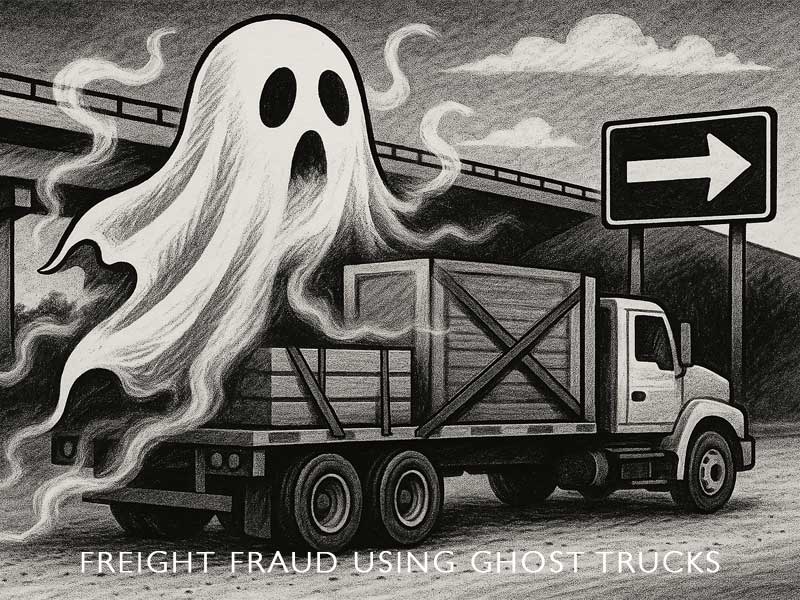
Freight fraud is a serious and growing problem within the trucking industry. And general contractors working on highway and infrastructure projects are not exempt from suffering the effects of criminal activity.
The most recent figures suggest freight scams have increased by around 600%
Whether you’re moving aggregates, heavy machinery, concrete forms, or bridge components, any kind of fraud can disrupt your project.
Understanding how these scams typically operate is key to avoiding costly setbacks and protecting your supply chain.
So – let’s run through them again. Because while people are focusing on tech advancements, sustainability, and new regulations, scammers have the perfect opportunity to move under the trucking industry’s radar!
Double Brokering in the Trucking Industry
Double brokering in the infrastructure sector occurs when a broker accepts a load of construction materials or heavy equipment and then passes it off to another carrier without notifying the contractor.
This can result in major delays, especially if the equipment doesn’t show up on site when crews are scheduled to install it.
Double brokering also creates confusion over liability if materials are damaged or go missing in transit – something you can’t afford during tight construction windows.
Carrier Identity Theft in Trucking Companies
This scheme involves fraudsters pretending to be a legitimate construction-hauling carrier – often one with a reputation for transporting oversized or specialized loads.
By using lookalike DOT numbers and forged credentials, they get access to job-critical shipments like bulldozers or concrete barriers. When those materials or machines never arrive, you are left scrambling to keep crews and schedules on track.
Fake Hauling Services
Fake carrier setups are particularly dangerous for infrastructure projects that rely on subcontracted logistics.
Scammers use stolen credentials or fabricated documents to pose as reliable haulers for key loads – like steel beams or drainage components. Once they take the load, they vanish, leaving you without vital materials and possibly delaying regulatory inspections or milestones.
Hijacking a Trucking Company’s Identity
With identity hijacking – as opposed to carrier identity theft – fraudsters seize control of an actual trucking company’s authority or DOT credentials and then use that stolen identity to book infrastructure loads.
This is especially risky for public works projects that require pre-qualified or union-compliant carriers. When a hijacked identity is used, the contractor risks not just theft, but also potential legal exposure and contract violations.
Ghost Trucks in Freight Fraud
Ghost trucks don’t actually exist. They’re fictional rigs listed with fake drivers, VINs, and route information.
For infrastructure jobs, these may appear as vehicles assigned to haul precast concrete or large culverts, complete with forged weight tickets and inspection logs.
The scam often fools even experienced dispatchers until it’s too late and the equipment never arrives at the jobsite.
Payment Diversion Scams in Trucking
These scams target accounts payable departments at large construction firms or subcontractors.
Fraudsters impersonate legitimate carriers and submit fake invoices for hauling materials like fill dirt or crash attenuators. Once the payment is made, the funds are funneled through fake companies and are virtually impossible to recover – while the real carrier waits unpaid and the job faces hold-ups.
Fake Load Boards or Listings in the Trucking Industry
Some scammers set up fake platforms that look like legitimate load boards, specifically targeting contractors sourcing logistics for infrastructure projects.
They post listings for material hauls or backhauls related to roadwork or bridge repairs, and lure contractors or small fleet owners into providing personal and business information.
These fake listings can result in stolen data, compromised bank accounts, or false equipment dispatches.
Cargo Theft Disguised as Legitimate Pickup
This method of freight fraud involves criminals impersonating authorized drivers to pick up critical infrastructure materials. These might be jersey barriers, high-value geotextile rolls, or expensive survey equipment.
When the load disappears, job delays cascade across the project timeline, impacting not just cost but DOT or municipal deadlines as well.
Cowboy Trucking is Your Reliable Trucking Industry Partner
At Cowboy Trucking – a Texas trucking company of many decades’ standing – we understand how damaging freight fraud in the trucking industry can be. That’s why we take extra steps to verify every load and maintain ongoing communication for your peace of mind.
If you’re looking to enhance the safety of your project by searching for “hauling services near me,” give us a call and let’s talk.
Image produced by author using ChatGPT
